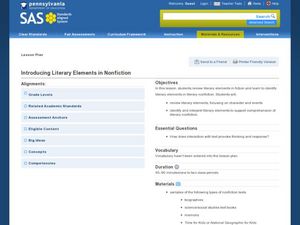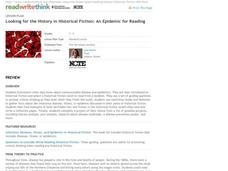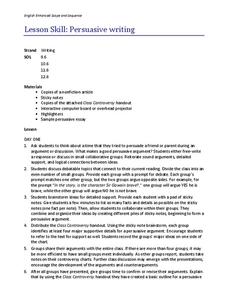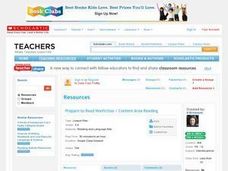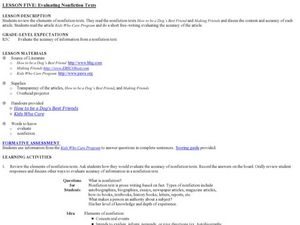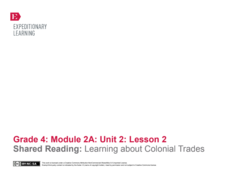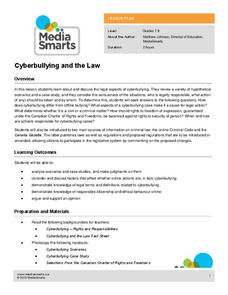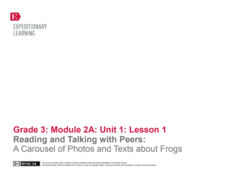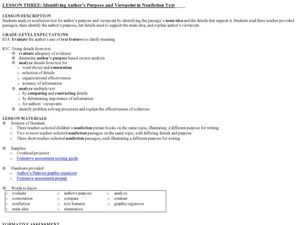Curated OER
Short and Sweet Science
Readers learn how to summarize scientific text and evaluate the advantages, disadvantages, and challenges in writing summaries. They select science-related articles you've pulled and collected from the New York Times and, with a partner,...
Curated OER
Narrative Writing
Students complete activities to learn narrative writing. In this narrative writing lesson plan students are given writing prompts in order to better understand how to write in a narrative format.
Curated OER
Lesson 1: Identifying Information in Nonfiction
If you are in need of a lesson on identifying information in a non-fiction text, look no further. The class learns how to use a KWL chart to identify explicit information in the book, Frogs by Gail Gibbons. They fill out the KWL...
Curated OER
Introducing Literacy Elements in Nonfiction
Explore nonfiction writing with your class. They will identify elements in nonfiction by reviewing elements of fiction. Then they use biographies, memoirs, menus, Time for Kids, and text books to identify elements of nonfiction. They...
Curated OER
You Be the Judge
Students explore nonfiction writing by completing a worksheet in class. In this research questions lesson, students read several stories about the Wild West icons Wyatt Earp and Wild Bill Hickok. Students answer study questions about the...
ReadWriteThink
Looking for the History in Historical Fiction: An Epidemic for Reading
Combine informational reading skills with fictional text in an innovative historical fiction lessons. After reading a fictional text related to diseases, class members read non-fictional text to gain knowledge about specific infectious...
Curated OER
Creating a Newspaper
Get the scoop with a fun, engaging newspaper project. After analyzing the parts of a newspaper, including the headline, subtitles, and pictures or images, young journalists get to work by writing their own stories in a newspaper article...
Virginia Department of Education
Persuasive Writing
Grab a debatable (or controversial) moment from your current reading, and use this task to progress the persuasive writing skills of your high school scholars. Divide your learners into four small groups and let them collaborate, debate,...
Turabian Teacher Collaborative
Parts of Argument II: Article Critique
Break down the parts of argumentative writing with a critical thinking activity. High schoolers read an article of your (or their choice), and use a graphic organizer to delineate the ways the author structures his or her arguments.
EngageNY
Grade 9 ELA Module 1, Unit 1, Lesson 5
Finding the central idea in a text is equally important in fiction and nonfiction. Work on analyzing a piece of writing for the central idea with Karen Russell's "St. Lucy's Home for Girls Raised by Wolves," complete with supporting...
Curated OER
Organizational Structures of Nonfiction Text/Graphic Organizers
Fifth graders review the characteristics of a nonfiction text. In this language arts lesson, 5th graders understand that one can use a specific graphic organizer to help them in understanding an organizational structure. For example, in...
Curated OER
NonFiction Reading
Students explore reading nonfiction. In this nonfiction lesson plan, students practice using KWL charts to organize nonfiction information gained from reading. Students explore unfamiliar words from reading and recognize synonyms and...
Curated OER
Evaluating Nonfiction Texts
Students evaluate nonfiction text. In this evaluating nonfiction lesson students read two pieces of nonfiction text and respond with a short free-writing piece. Students discuss the content and focus on the accuracy.
Curated OER
Fiction vs. Nonfiction
Students explore fiction and nonfiction writing. They identify the elements of fiction in a short story and identify the criteria necessary in a nonfiction piece. Students distinguish the author's purpose in an expository text,...
EngageNY
Shared Reading: Learning About Colonial Trades
Trading in Colonial America is the focus of a lesson plan that boosts reading skills. As a class, scholars examine the informational text for crucial details, use their newfound knowledge to share information with their peers, and write...
Media Smarts
Cyberbullying and the Law
Dealing with the very topical subject of cyberbullying, this lesson plan will surely create some engaged discussion in your classroom. Young learners discuss the laws concerning cyberbullying in Canada, and then respond to a series of...
Curated OER
Writing Process- Expository Writing
Expository writing is the focus of the language arts lesson presented here. In it, young writers review what expository writing is through a class discussion and teacher demonstration. Then, learners write expository text that describes...
Curated OER
Narrative Writing vs. Explanatory Writing
The class discusses the different purposes an author has for writing. The focus of the discussion is on writing to tell a true story and writing to give information about a specific topic. There are writing purpose sorting cards embedded...
EngageNY
Analyzing the Significance of the Novel’s Title: Connecting the Universal Refugee Experience to Inside Out and Back Again, Part 2
How does poetry help people better understand societal issues? Pupils participate in a jigsaw activity to analyze poems from the novel Inside Out & Back Again. Next, they connect the poems to real-life refugee experiences from the...
EngageNY
Reading and Talking with Peers: A Carousel of Photos and Texts about Frogs
Frogs are the theme of a lesson plan that challenges scholars to examine photographs, read informational texts, then ask and answer questions. Scholars work collaboratelively as they rotate through stations, discuss their observations,...
Curated OER
Exploring Arizona's Biotic Communities Lesson 1: Mapping Biotic Communities
As part of a unit on Arizona's biotic communities, young ecology learners create a map. They describe how humans and animals adapt in their habitat. They take notes and create graphic organizers from articles they read. Beautiful maps,...
Curated OER
Identifying Author’s Purpose and Viewpoint in Nonfiction Text
Why do people write books? Pupils discover how to identify the author's viewpoint. They read non-fiction passages their instructor selects (the plan has the class look at nonfiction children's picture books), and then identify the...
EngageNY
Close Reading of Bullfrog at Magnolia Circle: Main Ideas about the Bullfrog
As your class reaches the end of the book Bullfrog at Magnolia Circle, the seventh lesson in this literary unit helps third graders transition from reading narrative to expository writing. Scholars develop their note-taking skills...
Curated OER
Putting the Truth in Writing
Students define "nonfiction" and describe what they view as the best pieces of nonfiction writing. They determine criteria to evaluate whether or not a piece of nonfiction writing is good, and list categories of nonfiction writing.



